He pēpi
Congratulations to David Mason and Gemma Trezise on the arrival of their new baby taonga, Tuhuru William Trezise-Mason. Tuhuru was delivered by his pāpā at Greymouth Hospital on 14 August weighing 8lb 9oz and 57cm in length. Goodbye tummy – hello mummy (and pāpā). May your little bundle of joy bring you more happiness.
Wishing you a future filled with love, joy and laughter. Parenthood is one of the best journeys in life, we hope you enjoy the ride. Get ready for mud, big trucks, sling-shots, a never-ending appetite, skinned-knees, and action figures. May your new little one grow strong, healthy and wise. Wishing you all the best. Aunty loves you Tuhuru xoxo.
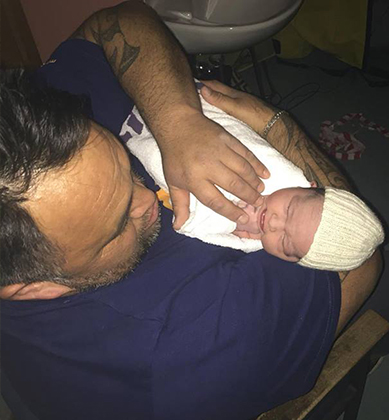
Tuhuru in the arms of his pāpā, David Mason.
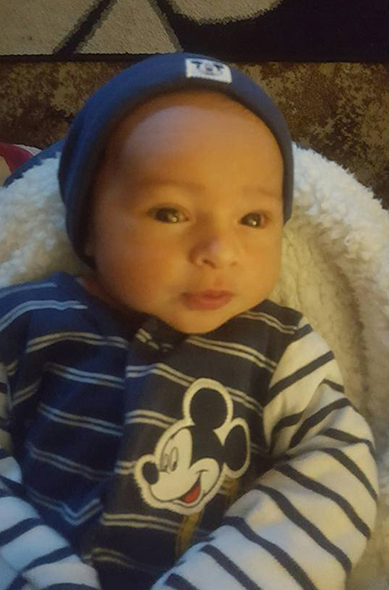
Tuhuru William Trezise-Mason.
Hīkoi Waewae launch
On Saturday 27 August we launched ‘Hīkoi Waewae’ at Arahura Marae. It was well-attended with over 40 whānau present to support the kaupapa throughout the course of the day. Hīkoi Waewae is a walking/hiking/tramping rōpū based in Te Tai Poutini. During our hīkoi we will be learning mātauranga Māori including whakapapa, tikanga, karakia, te reo, ngā hua o te ngahere, and mihi pepehā.
We have incorporated the following values into our kaupapa. Whanaungatanga, Kaitiakitanga, Kotahitanga and Whānau Ora. Our aim is to reconnect with our whenua by walking in the footsteps of our tūpuna. To regain a sense of connection and belonging. Experience wellbeing through fitness and spending time in our natural environment, breathing clean fresh air and disconnecting from technology.
We had a presentation by Tim Shaw from the Department of Conservation, which covered health and safety, appropriate clothing and footwear, recommended gear list, informative websites, river crossing information and other helpful tips. Aunty Horiana Tootell taught us a waiata about home and also contains the names of some of our different types of pounamu. Included in our itinerary was a planning session for the Hīkoi Waewae rōpū. We dreamt together and pulled some dreams into the bubble, then worked out the steps we need to make along the way to ensure we achieve our goals.
Our funder, Te Pūtahitanga were represented by Trisha Harrison-Hunt who gave an informative kōrero about the current funding rounds and the role of Te Pūtahitanga in Te Waipounamu. In the evening we were held spell-bound by kōrero about our Whare Whakairo (Tūhuru), whakapapa and history of Te Tai Poutini which was presented to us by Jerry Pu and Caleb Robinson. We also enjoyed delicious kai prepared for us by Miriama Johnsen and Miriam Downs.
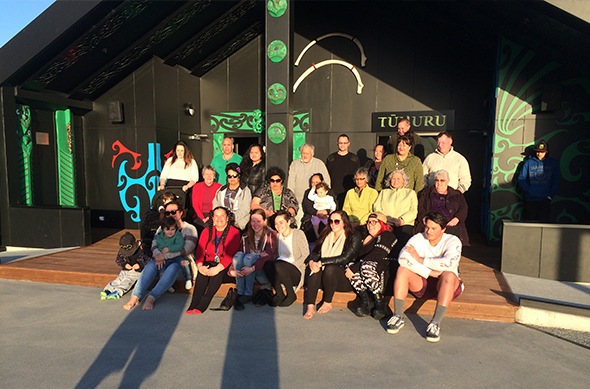
Whānau from the launch of Hīkoi Waewae.

Rauhine and her moko Violet Curtis on the picnic point, Mananui walk way.
Congratulations
Avalon and Cheyenne Te Haara-Barr have both had a very successful final year at their respective schools. Avalon and Cheyenne are the daughters of John and Annie Te Haara–Barr (based in Christchurch) and mokopuna of Stuart and Sue Barr. Stuart has served on our rūnanganui (executive) as our kaipūtea for five terms. Avalon is in her final year at Russley Primary School and was awarded a Sir Peter Blake Medal in recognition of her youth leadership and academic results achieved. Cheyenne has had an equally successful final year in her role as Head Girl at Riccarton High School. A highlight for Cheyenne was being chosen as a member of the Youth Parliament by local MP Megan Woods. This achievement gave Cheyenne the opportunity to speak in Parliament in July.

Avalon and Cheyenne Te Haara-Barr.
Te Pōkai Ao
In October this year, 10 Ngāi Tahu taiohi (rangatahi/youth) will go to Silicon Valley, San Francisco, USA to attend a five-day science, technology, engineering and mathematics (STEM) boot camp.
Te Rūnanga o Ngāi Tahu and Te Tapuae o Rehua have partnered with Callaghan Innovation and NZQA to offer this amazing opportunity. Inspiration is drawn from the traditions of innovation and transformation of Ngāi Tahu tūpuna, who would transform themselves and the environment to meet their needs – risk-taking and exploring – fed by courage, curiosity and passion.
The tradition of Tamatea Pōkai Whenua, Pōkai Moana of the Tākitimu waka is used as an exemplar – as a legendary traveller, an explorer of land and water, uninhibited by the obstacles he happened upon and, with a commitment to problem solving to ensure the survival and prosperity of his people.
As part of their pre-bootcamp activities, a noho marae and design-thinking workshop was held at Wairewa Marae. The purpose of this noho marae was for Kathrine Wiki Arapeta, Tiaki Huria, Bethany Kaye-Blake, Abraham Hix, Luca Mackenzie, Samuel Wixon, Nathaniel Cashell, Kiliona Tamati-Tupa’i, Sarah Langsbury and Ngahiraka Dallas to be introduced to Ngāi Tahu tikanga, waiata and haka, and, for the participants to learn and extend their mihimihi. It also gave them a chance to form bonds, and understand what is expected of them over the next two months leading up to their haerenga to Stanford.
They will be supported by four capable tuākana: Gaynor Hakaria, Te Rau Winterburn, Madison Henry and Jess Templeton. We wish them all safe travels, and can’t wait to hear about their stories and adventures on their return. Haere pai atu, hoki pai mai.

Te Pōkai Ao rōpū at Wairewa Marae.
Kā Toi Māori o Aoraki
The 10th FLAVA Festival, ‘Kā Toi Māori o Aoraki’ was held 19 August at the Theatre Royal. There were 18 kura and 12 early childhood centres from the Aoraki region, between the Waitaki and Rakaia rivers, who joined us for the ‘Korohi o Te Pēpi’ (singing of the babies).
The FLAVA festival provides students with an opportunity to discover and experience a breath-taking lens into Te Ao Māori (the world of Māori), and an opportunity to showcase and view their wonderful talent. At the same time, whānau, friends and the wider community were able to enjoy a truly bicultural festival comprised of three categories: kapa haka (traditional dance and waiata), performing arts (waiata, whaikōrero, short stage drama, music, dance and other stage performances) and visual arts (two- and three-dimensional paintings, drawings, sculptures, and weaving).
The festival was organised by Arowhenua Whānau Services, alongside a steering group that included teachers and a number of community organisations.
Once again, the festival was a huge success, with the Theatre Royal and Caroline Bay Hall being packed to capacity for the full day. Groups that had clearly devoted long hours to perfecting their skills treated the audience to some incredibly colourful and exciting performances.
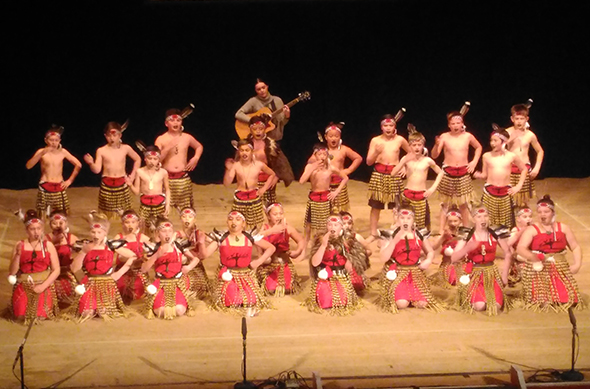
One of the rōpū performing at FLAVA Festival.
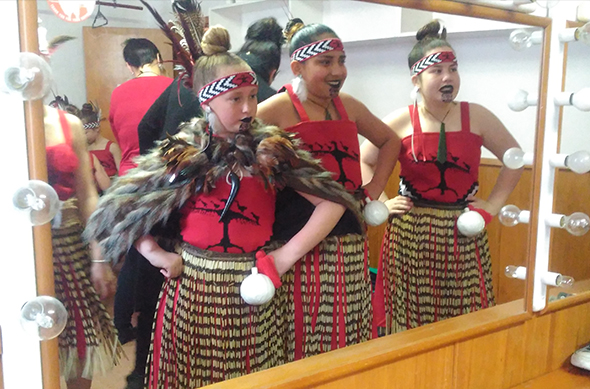
Tamariki prepare to take the stage.
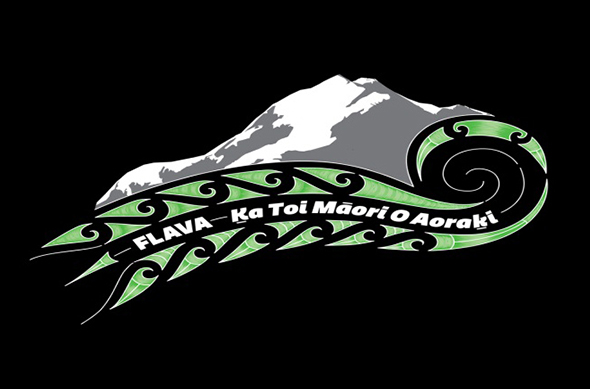
Congratulations
Six year-old Ranui Te Maiharoa is all smiles after receiving the Most Improved Player for 2016 at the Maheno Rugby Club. Ranui loves playing rugby and can’t wait until next season when she will be able to play tackle rugby.

Ranui Te Maiharoa with her trophy.
Kawa ki Ōtākou
A very successful hui was held on 30 July with around 40 hapū members and local whānau in attendance. Everyone was keen to meet again so we will be holding another one.
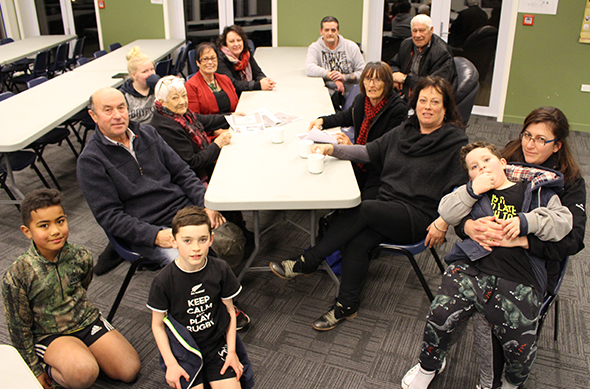
From left: A friend of Taiaroa McDonald, Taiaroa McDonald, Edward Ellison, Aunty Koara Harborne, Erena Russell-Harris, Anne Robertson, Michelle Taiaroa-McDonald, Wayne Frisby, Paul Karaitiana, Robyn nēe Harborne, Julie Rita (nēe Asher), Tukitaharangi Potiki on the knee of his mother, Megan Potiki.
Responsive writing programme
Ōraka Aparima Rūnaka members hosted nine Aparima College students and support staff for a lunch at Takutai o Te Tītī Marae. Rangimaria Suddaby, Lynley McKay and Riki Dallas have been involved in a responsive writing programme, arranged by the college during term three. The programme was the first time the pen-pals have met each other. Once the introductions were exchanged we were able to further discuss each other’s interests. It was great to find out two of the students have connections to the Ōraka Aparima Rūnaka. This programme was also assisted by Stewart Bull and Rebecca McKay, and has seen vast improvements in the students’ writing and confidence. It will continue for the rest of the term and into the future.

Responsive writing group 2016.
He pēpi
Ko Ruapuke te motu whakaruru, he manawa tītī.
Ko Makere te toa whakawhana, he kāhu kōrako.
Tīhei mauri ora.
Piri and Gaylene Sciascia have welcomed two new mokopuna, taking the moko-tally to 11.
Hunter Te Arawai Vavatau Sciascia-Taufao was born 30 November 2015 to Byron Taufao (Kāi Tahu, Samoa, Ngāti Toa) and Atareta Sciascia (Kāi Tahu, Ngāti Kahungunu).
Piriponatahuri Te Painga Māpuna Sciascia born 1 February. Piriponatahuri is the mātāmua of Tumarangai Sciascia (Kāi Tahu, Ngāti Kahungunu) and Dee Sciascia née O’Carroll (Ngaruahine, Ngāti Ruanui and Te Ati Awa).
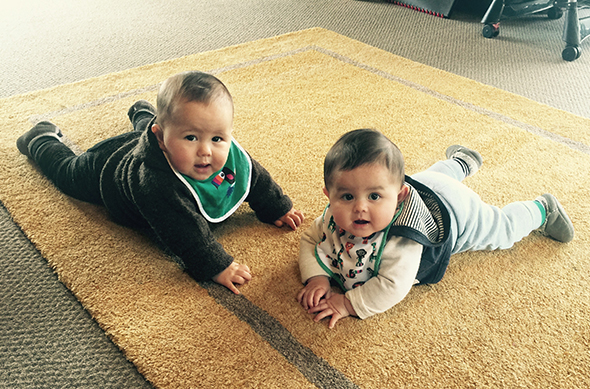
Left to Right: Hunter Sciascia-Taufao and Piriponatahuri Sciascia.
Te Uru Rangi scholarship winner
Kia ora. My name is Hape Ki Tuarangi. I’m a recipient of Te Uru Rangi scholarship and a recent graduate at Enspiral Dev Academy in Wellington. Here is a little bit about my background, whakapapa and future ambitions.
I’m 25 years-old and te reo Māori is my first language. I was born and bred in Ōtaki. I attended Kōhanga Reo, Kura Kaupapa Māori, Wharekura and Whare Wānanga. I have two children, who are also following in my footsteps and currently attend kura. For the past five years, I have been the Moodle Administrator/Developer at Te Wānanga o Raukawa – the Māori tertiary institution here in Ōtaki. During that time, I have been fortunate to learn from the likes of Antony Royal, who has been a mentor to me. I have helped set up and maintain a learning management system, along with a handful of other I.T projects.
Pērā ki te nuinga o tātou te iwi Māori he nui āku hononga ki roto o tēnā iwi, o tēnā iwi. Like most Māori I have a rich whakapapa that connects me to various iwi and marae around the country. On my mother’s side though my grandmother Robyn Crocome, I have connections back to Kāti Huirapa ki Puketeraki, which is how I was eligible to apply for Te Uru Rangi Scholarship.
However, I grew up in the rohe of Ngāti Raukawa, so usually when asked about my whakapapa or pepeha that is the iwi I refer back to. By receiving Te Uru Rangi through Ngāi Tahu, I have made a commitment to myself to learn and reconnect with my hononga and whakapapa in the South Island.
Now that I have graduated, my aim is to get a job in the industry where I can continue to learn and acquire the skills and networks to create tools that will help further the revitalisation of te reo Māori and the continuum of Mātauranga Māori. I have a lot of big dreams and ideas that I would love to see happen in the near future, which is why I am so passionate about this industry. Finally, I would love to go back to my kura and other kura, to teach our tamariki not only how to code, but to prepare them for a world that is so reliant on I.T and people who can understand its language.
I would like to take this opportunity to acknowledge the support I have received from Ngāi Tahu. If it wasn’t for their support, provided through Te Uru Rangi scholarship, I wouldn’t have been able to attend Enspiral Dev Academy and take part in the amazing and new learning environment that they have created in Wellington. This experience has enabled me to create better opportunities for myself and get me off to a great start on my career change and to building a better future for me, my whānau, hapū and iwi. E kore au e ngaro he kākano i ruia mai i Rangiātea. Nā Hape.

Hape Ki Tuarangi Cook (centre) and his partner Waima Mihaka (right), Te Haumoana Cook (top) and Haeata Reremoana Cook (left).
Pēpi packs
We have now distributed 179 packs to whānau. The feedback from those receiving these packs has been so positive, we figure sometimes a picture is worth a thousand words. Here are some of our Ngāi Tahu pēpi enjoying the contents of their packs.
Nau mai e rea kia mihi atu tō iwi ki a koe. Weaving the newest strands of Tahu.
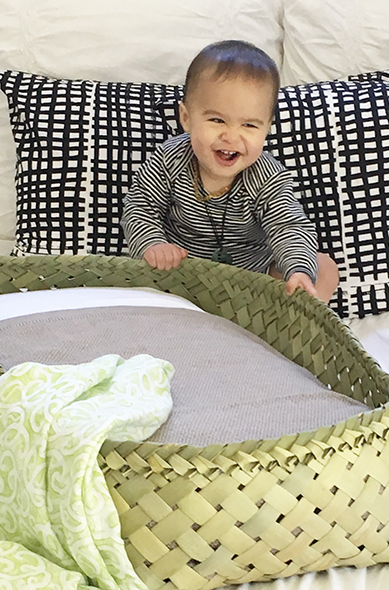
Sebastian Lardelli.
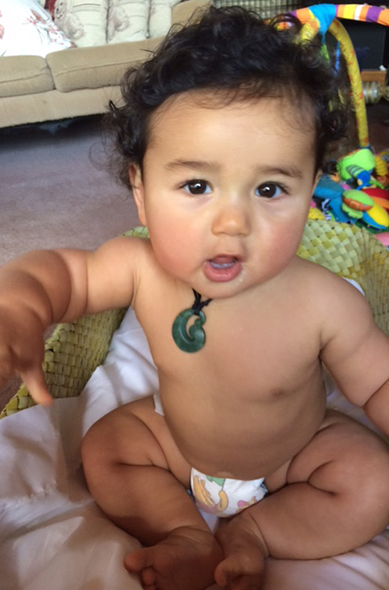
Benjamin Thomas.
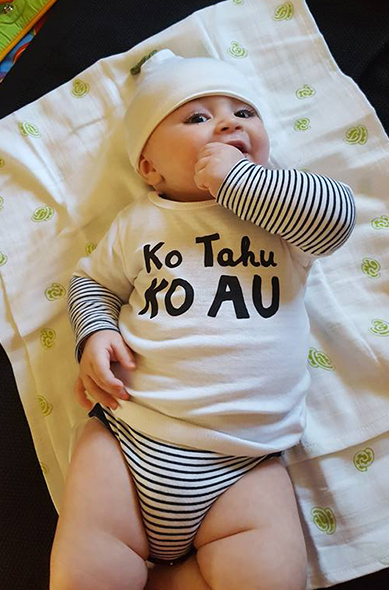
Louie Anglem.

Move our Motu – Whirinaki Fund
In wave three of the Whānau Ora commissioning of Te Pūtahitanga o Te Waipounamu, a specific fund was introduced targeted at increasing the health and wellbeing through a medium of physical and cultural activity. The intent of the ‘Move our Motu’ event held in early May was to bring together stakeholders to encourage collaboration and innovative ways to increase whānau physical and cultural activity. The event was focused on generating initiatives which are driven by the Whānau Ora outcomes, and in particular Pou Rua: living healthy lifestyles and Pou Whā: Whānau in Te Waipounamu are confidently participating in Te Ao Māori.
Goals of the two-day wānanga held at Hagley Oval, included to support applicants to strengthen the impact of the initiatives through a focus on capability development, as well as encouraging applicants to explore potential collaborations. Approximately 90 people attended the weekend event designed to:
- provide practical support to advance ideas to be investment ready (for example, to be prepared to submit quality applications)
- create a safe space for participants to explore collaboration opportunities
- provide structured support for initiative development through resources and the availability of mentors to guide the process.
As part of the weekend we had inspiring keynotes from Gilbert Enoka (All Blacks Mental Skills Coach), Heather Skipworth (Iron Māori Founder) and Dallas Seymour (Ex All Black and NZ Sevens Player). Here’s some feedback from the event:
“There were so many people that attended and every idea was different. I found that very inspirational.”
“A truly uplifting experience”
“Exceeded my expectations”
“Such great calibre of mentors on hand and very keen to help.”
When the Minister for Whānau Ora announced the successful recipients of Wave Three at Te Pūtahitanga symposium, 7-8 July, (Te Aho Mutunga Kore/The Eternal Thread) there were a number of initiatives that were clearly focused on health and wellbeing, including: Try Whānau (Murihiku); kaupapa yoga (Ōtautahi); Tri-Pounamu in partnership with Iron Māori; Te Ngākau Pono; Rangatahi Tumeke (Catlins); Hīkoi to Hauora (Murihiku); Hīkoi Waewae (Hokitika); He Waka Kōtuia (Ōtepoti) and Manawa Ora (Whakatū Marae, Nelson).


Rōpū with guest speaker, Gilbert Enoka, second from left.

Rōpū with guest speaker, Gilbert Enoka, second from left.
Do you have a cultural project?
The Ngāi Tahu Fund was established to vitalise, strengthen and grow Ngāi Tahutanga.
The next funding round is now open and applications close on Friday 31 March 2017. For fairness to others, we will not be accepting any late or incomplete applications.
What we look at funding:
- The Fund focuses on supporting cultural projects around:
- Whakapapa – kinship
- Tikanga – protocols and customs
- Te reo – language
- Mahi toi – creative expression
- Whenua – landscape, place and locality
- Mahinga kai – customary food gathering, species protection and restoration
- Ngā uara – values and beliefs
- Ā kāinga, ā hapū, ā iwi – community engagement and participation; and
- Mana tangata – self-determination and self-confidence.
How much we fund:
- He kaupapa iti – small projects for individuals (up to $5,000)
- He kaupapa nui – medium projects (up to $30,000)
- He kaupapa nui rawa – (over $30,000) – a written expression of interest should accompany all large/transformational applications, please contact the Fund’s team in advance if you intend to submit a large project.
The full criteria for accessing funding is contained in the application form, which can be downloaded from our website: www.ngaitahufund.com. Our funding committee meet in May to discuss the applications, so ensure your project does not start before this date as there is no retrospective funding available. The team are available to meet with you to work through the application process, or feel free to contact our advisor, Morgan Lee on 0800 KAI TAHU (0800 524 8248) or email: [email protected]

Rangatahi during Rangatahi Tumeke, a kaupapa which has received funding from the Ngāi Tahu Fund.